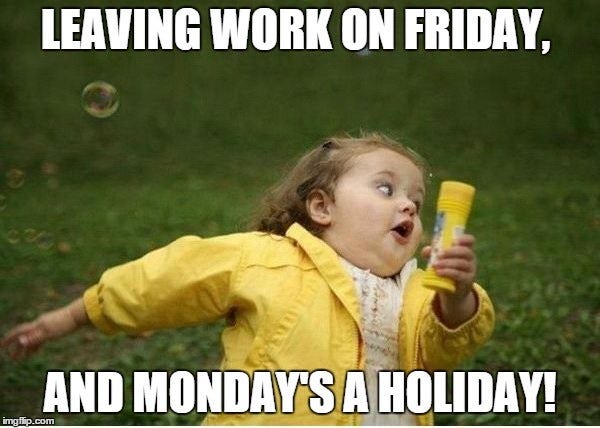The trouble with “Happy Friday!”
Around the offices I have been in, there is a genuine air of lightness on Fridays. People greet each other with “Happy Friday!” They give off an air of a convict about to get free from the prison of work and escape into the paradise of the weekend. The trouble is, the weekend ends. If you ask them on Monday, how was your weekend, the most common answer is “Too short!” The nonchalance with which people say these things simply reflects the zeitgeist of the modern workplace. Do a search online about Monday Friday memes, and you will be shocked at the sheer volume out there! Here are a couple:


Why don’t more people feel like this:

A common ice-breaker question is, “What would you do if you won the lottery?” I have never heard anyone say, “I will show up at work even more fearlessly, and do my best work.” Most people talk about things involving beaches and drinks that are served with tiny umbrellas. This signifies a huge, deep-seated problem. Why is it that most people would choose not to work, if it wasn’t for the paycheck? (Another Monday meme: “I hate Mondays. But I hate being broke even more.”)
Given that work is what we do with most of our discretionary time, it is a shame that the attitude most people have about work smack more of compulsion and necessity rather than of passion, engagement and energy. I seem to recall reading that only 8% people in the US report being energized by the work they do. And then there is the Gallup engagement metric, which is stuck at 30% since the 70s. Only 30% of employees in the US are engaged in their work.
So what is it that people need?
Perhaps, Maslow’s hierarchy of needs offers a clue:

Let’s start at the bottom of the pyramid — physiological needs and safety. The advancements in civilization mean that the basic needs of human beings are being met more and more readily. We, the denizens of the industrialized world, don’t fear for life and limb, and food, water, shelter, clothes are plentifully available. (This was written before COVID-19, but the point kind of remains.)
The days of job security are gone, and for good reason, but one’s real safety lies not in holding on to one’s job no matter what, but in one’s skills, in the ability one has to solve certain kinds of problems for a certain kind of organization. Our education and on-the-job training endow us with those skills and if our employment ended in one place, we wouldn’t have too much trouble finding another job. So it is not the physiological safety or job security that is the core need of modern humans, but what was called psychological safety by a recent Google study into what makes perfect teams. The finding in the study was that high performing teams at Google were different on a host of variables, but the one thing that they all had in common was a sense of “psychological safety” that they afforded to their members. What that means is that If people are afraid of being ridiculed, attacked, disrespected, or even ‘just’ excluded, ignored, etc. then they cannot bring their whole self to work, they won’t contribute with everything they have got and hence that team won’t perform as well as it could. It seems like common sense. But then again, common sense is so uncommon.
So providing psychological safety is a great start, but where would a progressive organization go next?
Next up on the ladder is Belonging.
In our recent evolutionary past, human beings used to live our entire life in the village in which we were born. We had a great sense of belonging in our community, our tribe. We hunted together, gathered together, tended the fields together. Our life was built more around collaboration with our fellow beings, rather than on competition. There was a great sense of connection to the people around us, to the land and to our livelihood. Our ancestors may not have had as many creature comforts as we did, but they didn’t feel as lonely and depressed as we do.
Thoreaux foresaw this when he said “the mass of men lead lives of quiet desperation” in the early days of the Industrial Revolution which changed everything. The nature of work changed rapidly. Billions of people were lifted out of poverty. Quality of life improved dramatically, at least as measured by availability of basic utilities like electricity, heating, sanitation, etc. Along with that, came lots of social mobility and geographic mobility. As a beneficiary of this dramatic mobility of high-end labor, I wouldn’t have it any other way. But we would be remiss if we don’t pay attention to its shadow — the lack of engagement that afflicts the modern workplace. No less a mind than Nassim Nicholas Taleb called the modern worker a slave.
I would argue that the fundamental reason for that is the transactional relationship between the modern workplace and worker. Despite their platitudes to the contrary, for a large organization, an employee is merely a resource, a fungible one, a cog in the machine. And for most employees, a workplace is a source of paycheck. Work is a means to an end. There is no emotional attachment. We are too cynical to care. Our leaders give us no reason to care.
It seems like still more common sense that in order to perform better, offering a sense of belonging can truly help an organization unleash its human talent. Think about it, what else is out there in a person’s life that can provide a sense of belonging? If the workplace is not going to offer us a sense of belonging, nothing else can. We do not spend as much time and energy on anything else — our extended family, our friends, our alumni community, our church, our sports teams, our hobby clubs, etc. — as we spend on our workplace. Our identity is no longer derived from our ancestry, the region of the world we hail from, the historical profession handed down in our family, the language we speak, or any other marker of belonging to a particular community. We are citizens of the world. But in being so mobile and having the ability to belong to anything, we end up belonging to nothing. We have no roots, no identity, no sense of belonging to this or that.
Companies are the most powerful institution in the world today, even more than governments. Whether they like it, accept it and sign-up for it or not, the reality is that there is nothing like an organization to create a community and give it a sense of belonging. An organization, that travels up the Maslowian pyramid has a much better chance of being one that people show up to on Monday mornings as excited as they were on Friday evening. That is not only possible, it is imperative for continued productivity gains, profitability, talent retention, and coping with increasing complexity. The first organizations to get there will have massive talent advantage, and hence massive advantages in business as well. It is not easy to do that. But it is a lot easier perhaps than some of the moonshot business strategies that the modern organization is willing to try. It hasn’t been done yet. But it will be, in a time not so far out.
